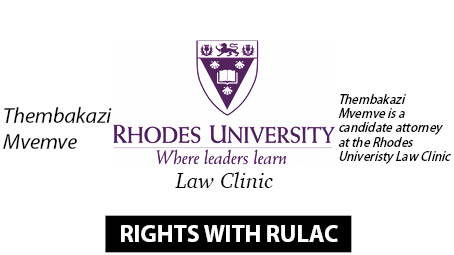By SIPESIHLE MGUGA
Gideon Mather is a mechanic currently living at Acrobats Court in Grahamstown with his wife Asanda and their 12-year-old daughter, Avumile. Gideon and his family are originally from Butterworth and they moved to Grahamstown in January 2018.
When Gideon and his family arrived in Grahamstown, he concluded a periodic (month-to-month) lease agreement with one Ms Stacy Philips. The terms of the agreement were that rent would be R3500 per month and it would be paid on the 1st of every month.
Gideon has been fulfilling his obligations in terms of the lease agreement, in that he pays his rent on time. There have been no transgressions from his side.
Stacy, Gideon’s landlady, met Sanele Mhlaba on 16 April 2018, a young gentleman who had recently moved to Grahamstown and was desperate for accommodation. When Sanele informed Stacy that he was looking for a place to stay, she mentioned to him that she had a one-bedroom flat available for R4500 a month. Sanele thought that this was a good offer and he accepted. The agreement was that Sanele would move in at the end of April 2018.
Stacy visited Gideon on 17 April 2018 and told him that he and his family had to move out at the end of the month. When he tried to protest, Stacy informed him that she was the owner of the property and therefore what she said went.
Now Gideon, without any reasonable notice, is left desperately looking for accommodation for his family.
Is the action by Stacy Philips lawful?
The Prevention of Illegal Eviction from and Unlawful Occupation of Land Act 19 of 1998 (also known as the PIE Act) regulates eviction proceedings in South Africa, and the Rental Housing Act regulates the termination of a lease agreement. Most important, section 26 of the Constitution states that everyone has the right to adequate housing.
The agreement concluded between Gideon and Stacy entitles Gideon to receive notice of termination of one calendar month, therefore the purported notice to vacate by Stacy is invalid. Essentially one month’s notice must be given of the intention by either party to terminate a lease.
Section 4 to 6 of the PIE Act makes provision for a just and equitable procedure to be followed for a successful eviction. Firstly, before the owner or a person in charge of a property initiates formal eviction proceedings the Act requires that he/she engages with the occupiers in an attempt to settle the matter out of court. Only when this informal process has failed can the owner or person in charge initiate formal eviction proceedings.
Second, the applicant must prove that he/she is the owner or person in charge of the land or property in question, whether a private person, a corporate entity, or an organ of state. The occupiers have to be properly identified and have to be shown to be unlawful occupiers. An unlawful occupier is a person who resides on another’s land or property without the owner’s tacit or explicit consent.
Third, reasonable notice must be given to the occupiers and the municipality within whose jurisdiction the land or property falls of any intention to evict occupiers.
Fourth, the applicant must show that he/she has the right to evict the occupiers and that the intended eviction is just and equitable, balancing all the parties’ interests.
In opposing formal eviction proceedings, the occupiers can approach an attorney to assist them. In their court papers the occupiers must show, among other things that they are not unlawful occupiers of the land or property in question.
Stacy Philips as the owner of the property has two rights: one of ownership and one of occupation. By leasing the property she does not limit her right of ownership at all. The right that she is trading with is the right of occupation. As the landlady, she gave her right of occupation to Gideon. However, even as the owner of the property, Stacy must follow the rules and procedures provided for in the legislation.
- Sipesihle Mguga is an attorney at the Rhodes University Law Clinic.
RHODES UNIVERSITY LAW CLINIC HELPING YOU
The Rhodes University Law Clinic strives to improve access to justice through the provision of free legal services to indigent people in most areas of law. In addition to its New Street offices, Law Clinic staff are available to clients at the Assumption Development Centre (Konongendi), Nceme Street, Joza, every Thursday from 9am-12pm.
The Law Clinic also provides monthly workshops on a wide range of topics in order to raise awareness of people’s rights. The workshops are conducted by staff of the Rhodes University Law Clinic at various locations around Grahamstown. For more detail, please contact the Assumption Development Centre (Konongendi) or the Rhodes Law Clinic:
Rhodes University Law Clinic
41 New Street, Grahamstown
Telephone 046 603 7656
lawclinic@ru.ac.za


